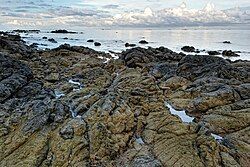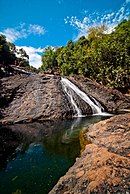Tangalan
Tangalan | |
|---|---|
| Municipality of Tangalan | |
 Tangalan seascape | |
 Map of Aklan with Tangalan highlighted | |
Location within the Philippines | |
| Coordinates: 11°46′39″N 122°15′37″E / 11.7775°N 122.2603°E | |
| Country | Philippines |
| Region | Western Visayas |
| Province | Aklan |
| District | 2nd district |
| Barangays | 15 (see Barangays) |
| Government | |
| • Type | Sangguniang Bayan |
| • Mayor | Gary T. Fuentes |
| • Vice Mayor | Gene T. Fuentes |
| • Representative | Teodorico T. Haresco Jr. |
| • Municipal Council | Members |
| • Electorate | 15,577 voters (2022) |
| Area | |
• Total | 74.59 km2 (28.80 sq mi) |
| Elevation | 39 m (128 ft) |
| Highest elevation | 876 m (2,874 ft) |
| Lowest elevation | 0 m (0 ft) |
| Population (2020 census)[3] | |
• Total | 23,704 |
| • Density | 320/km2 (820/sq mi) |
| • Households | 5,808 |
| Economy | |
| • Income class | 5th municipal income class |
| • Poverty incidence | 18.57 |
| • Revenue | ₱ 104.7 million (2020) |
| • Assets | ₱ 282.6 million (2020) |
| • Expenditure | ₱ 78.55 million (2020) |
| • Liabilities | ₱ 38.25 million (2020) |
| Service provider | |
| • Electricity | Aklan Electric Cooperative (AKELCO) |
| Time zone | UTC+8 (PST) |
| ZIP code | 5612 |
| PSGC | |
| IDD : area code | +63 (0)36 |
| Native languages | Aklanon Hiligaynon Tagalog |
| Website | www |
Tangalan, officially the Municipality of Tangalan (Aklanon: Banwa it Tangalan; Hiligaynon: Banwa sang Tangalan; Tagalog: Bayan ng Tangalan), is a municipality in the province of Aklan, Philippines. According to the 2020 census, it has a population of 23,704 people.[3]
History
[edit]Tangalan was formerly an arrabal of Makato. At the time of its creation, it included the following barrios: Tondog, Jawili, Dumatad, Afga, Baybay, Dapdap, Pudyot, Tagas, Tamalagon, Panayakan, Vivo, Lanipga, Napatag and Tamokoe.[5]
Geography
[edit]Tangalan is located at 11°46′39″N 122°15′37″E / 11.7775°N 122.2603°E. It is 18 kilometres (11 mi) from Kalibo, the provincial capital.
According to the Philippine Statistics Authority, the municipality has a land area of 74.59 square kilometres (28.80 sq mi) [6] constituting 4.10% of the 1,821.42-square-kilometre- (703.25 sq mi) total area of Aklan.
Climate
[edit]| Climate data for Tangalan, Aklan | |||||||||||||
|---|---|---|---|---|---|---|---|---|---|---|---|---|---|
| Month | Jan | Feb | Mar | Apr | May | Jun | Jul | Aug | Sep | Oct | Nov | Dec | Year |
| Mean daily maximum °C (°F) | 28 (82) |
29 (84) |
30 (86) |
32 (90) |
32 (90) |
31 (88) |
30 (86) |
29 (84) |
29 (84) |
29 (84) |
29 (84) |
28 (82) |
30 (85) |
| Mean daily minimum °C (°F) | 23 (73) |
23 (73) |
23 (73) |
24 (75) |
25 (77) |
25 (77) |
25 (77) |
24 (75) |
24 (75) |
24 (75) |
24 (75) |
23 (73) |
24 (75) |
| Average precipitation mm (inches) | 47 (1.9) |
33 (1.3) |
39 (1.5) |
48 (1.9) |
98 (3.9) |
150 (5.9) |
169 (6.7) |
147 (5.8) |
163 (6.4) |
172 (6.8) |
118 (4.6) |
80 (3.1) |
1,264 (49.8) |
| Average rainy days | 11.4 | 8.2 | 9.3 | 9.7 | 19.1 | 25.6 | 27.4 | 25.5 | 25.5 | 25.2 | 18.5 | 14.5 | 219.9 |
| Source: Meteoblue[7] | |||||||||||||
Barangays
[edit]Tangalan is politically subdivided into 15 barangays.[8] Each barangay consists of puroks and some have sitios.
| PSGC | Barangay | Population | ±% p.a. | |||
|---|---|---|---|---|---|---|
| 2020[3] | 2010[9] | |||||
| 060417001 | Afga | 6.8% | 1,612 | 1,472 | 0.91% | |
| 060417002 | Baybay | 6.7% | 1,597 | 1,582 | 0.09% | |
| 060417003 | Dapdap | 4.4% | 1,042 | 966 | 0.76% | |
| 060417004 | Dumatad | 4.8% | 1,130 | 1,051 | 0.73% | |
| 060417005 | Jawili | 7.7% | 1,822 | 1,732 | 0.51% | |
| 060417006 | Lanipga | 1.4% | 330 | 312 | 0.56% | |
| 060417007 | Napatag | 0.9% | 224 | 280 | −2.21% | |
| 060417008 | Panayakan | 13.1% | 3,116 | 2,684 | 1.50% | |
| 060417009 | Poblacion | 6.4% | 1,516 | 1,429 | 0.59% | |
| 060417010 | Pudiot | 7.7% | 1,828 | 1,617 | 1.23% | |
| 060417011 | Tagas | 10.2% | 2,407 | 2,017 | 1.78% | |
| 060417012 | Tamalagon | 11.0% | 2,609 | 2,497 | 0.44% | |
| 060417013 | Tamokoe | 0.6% | 154 | 228 | −3.85% | |
| 060417014 | Tondog | 8.2% | 1,955 | 1,745 | 1.14% | |
| 060417015 | Vivo | 2.4% | 574 | 665 | −1.46% | |
| Total | 23,704 | 20,277 | 1.57% | |||
Demographics
[edit]| Year | Pop. | ±% p.a. |
|---|---|---|
| 1903 | 3,009 | — |
| 1948 | 6,765 | +1.82% |
| 1960 | 7,650 | +1.03% |
| 1970 | 9,987 | +2.70% |
| 1975 | 10,509 | +1.03% |
| 1980 | 11,174 | +1.23% |
| 1990 | 14,773 | +2.83% |
| 1995 | 16,172 | +1.71% |
| 2000 | 17,606 | +1.84% |
| 2007 | 19,121 | +1.15% |
| 2010 | 20,277 | +2.16% |
| 2015 | 21,916 | +1.49% |
| 2020 | 23,704 | +1.55% |
| Source: Philippine Statistics Authority[10][9][11][12] | ||
In the 2020 census, Tangalan had a population of 23,704.[3] The population density was 320 inhabitants per square kilometre (830/sq mi).
Economy
[edit]Poverty incidence of Tangalan
10
20
30
40
50
2006
43.60 2009
42.50 2012
21.63 2015
23.46 2018
15.31 2021
18.57 Source: Philippine Statistics Authority[13][14][15][16][17][18][19][20] |
Tourism
[edit]
Tourist spots with government support under "Project Bugna" include Jawili Falls, Jawili Beach Resorts, Dumatad Souvenir Shop, and Bughawi Reforestation Project.
The Tangalan Marine Sanctuary covers 375 hectares (930 acres) of marine ecosystem and a 10 hectares (25 acres) coral garden.
References
[edit]- ^ Municipality of Tangalan | (DILG)
- ^ "2015 Census of Population, Report No. 3 – Population, Land Area, and Population Density" (PDF). Philippine Statistics Authority. Quezon City, Philippines. August 2016. ISSN 0117-1453. Archived (PDF) from the original on May 25, 2021. Retrieved July 16, 2021.
- ^ a b c d Census of Population (2020). "Region VI (Western Visayas)". Total Population by Province, City, Municipality and Barangay. Philippine Statistics Authority. Retrieved 8 July 2021.
- ^ "PSA Releases the 2021 City and Municipal Level Poverty Estimates". Philippine Statistics Authority. 2 April 2024. Retrieved 28 April 2024.
- ^ "Republic Act No. 285; An Act Creating the Municipality of Tangalan in the Province of Capiz". The Corpus Juris. 16 June 1948. Retrieved 22 October 2016.
- ^ "Province: Aklan". PSGC Interactive. Quezon City, Philippines: Philippine Statistics Authority. Retrieved 12 November 2016.
- ^ "Tangalan: Average Temperatures and Rainfall". Meteoblue. Retrieved 1 May 2020.
- ^ "Municipal: Tangalan". PSGC Interactive. Quezon City, Philippines: Philippine Statistics Authority. Retrieved 8 January 2016.
- ^ a b Census of Population and Housing (2010). "Region VI (Western Visayas)" (PDF). Total Population by Province, City, Municipality and Barangay. National Statistics Office. Retrieved 29 June 2016.
- ^ Census of Population (2015). "Region VI (Western Visayas)". Total Population by Province, City, Municipality and Barangay. Philippine Statistics Authority. Retrieved 20 June 2016.
- ^ Censuses of Population (1903–2007). "Region VI (Western Visayas)". Table 1. Population Enumerated in Various Censuses by Province/Highly Urbanized City: 1903 to 2007. National Statistics Office.
- ^ "Province of Aklan". Municipality Population Data. Local Water Utilities Administration Research Division. Retrieved 17 December 2016.
- ^ "Poverty incidence (PI):". Philippine Statistics Authority. Retrieved December 28, 2020.
- ^ "Estimation of Local Poverty in the Philippines" (PDF). Philippine Statistics Authority. 29 November 2005.
- ^ "2003 City and Municipal Level Poverty Estimates" (PDF). Philippine Statistics Authority. 23 March 2009.
- ^ "City and Municipal Level Poverty Estimates; 2006 and 2009" (PDF). Philippine Statistics Authority. 3 August 2012.
- ^ "2012 Municipal and City Level Poverty Estimates" (PDF). Philippine Statistics Authority. 31 May 2016.
- ^ "Municipal and City Level Small Area Poverty Estimates; 2009, 2012 and 2015". Philippine Statistics Authority. 10 July 2019.
- ^ "PSA Releases the 2018 Municipal and City Level Poverty Estimates". Philippine Statistics Authority. 15 December 2021. Retrieved 22 January 2022.
- ^ "PSA Releases the 2021 City and Municipal Level Poverty Estimates". Philippine Statistics Authority. 2 April 2024. Retrieved 28 April 2024.




